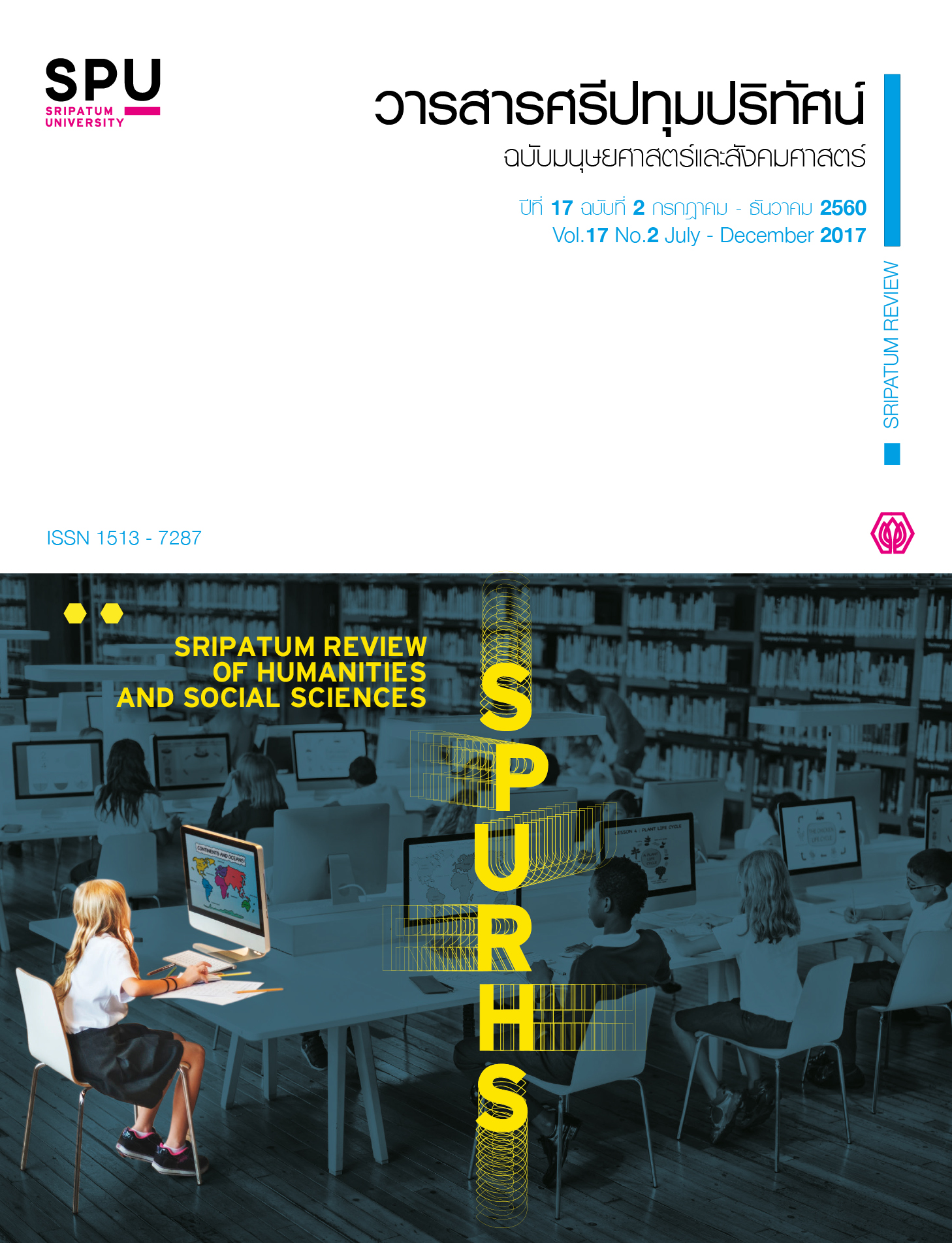A STUDY OF THE DESIRABLE CHARACTERISTICS OF WOMEN LEADERS IN LAO PDR
Main Article Content
Abstract
This research was designed as the mixed-method research involving the quantitative and qualitative research methodologies. Its purpose was to study of the desirable characteristics of women leaders in Lao PDR. The data collecting methods were in-depth interviews and the use of a questionnaire. The key informants for in-depth interviews were 13 high level executives at the policy or administrative levels of departments or ministries, all of which were purposively selected. The research sample for data collecting via the questionnaire consisted of 400 practitioners in public or private organizations in Lao PDR, all of which were selected by convenience sampling. The data were analyzed using basic statistics including the frequency, percentage, and mean. The research results revealed that the desirable characteristics of female leaders in Lao PDR consisted of 24 traits that received the overall expected rating mean at the high level (("X " ) ̅ = 4.11). When the traits were ranked from top to bottom, it was found that highest rated traits were (1) honesty (("X " ) ̅= 4.40), (2) morality (("X " ) ̅= 4.36), and (3) creating unity (("X " ) ̅= 4.31); while the highly rated traits were (4) diligence (("X " ) ̅= 4.21), (5) responsibility (("X " ) ̅= 4.20), (6) success-oriented (("X " ) ̅= 4.20), (7) social participation (("X " ) ̅= 4.20), (8) reliability (("X " ) ̅= 4.18), (9) problem solving ability (("X " ) ̅= 4.18), (10) meticulousness (("X " ) ̅= 4.18), (11) good planning (("X " ) ̅= 4.15), (12) sincerity (("X " ) ̅= 4.12), (13) perseverance (("X " ) ̅= 4.11), (14) expertise (("X " ) ̅= 4.11), (15) decision making skill (("X " ) ̅= 4.09), (16) knowledge and capability (("X " ) ̅= 4.06), (17) persuasion skill (("X " ) ̅= 4.05), (18) diplomatic skill (("X " ) ̅= 4.03), (19) counseling skill (("X " ) ̅= 4.02), (20) self-confidence (("X " ) ̅= 3.96), (21) systematic management skill (("X " ) ̅= 3.96), (22) language skills (("X " ) ̅= 3.82), (23) good education (("X " ) ̅= 3.77), and (24) power and authority (("X " ) ̅= 3.71).
Article Details
1. กองบรรณาธิการสงวนสิทธิ์ในการพิจารณาและตัดสินการตีพิมพ์บทความในวารสาร
2. บทความทุกเรื่องจะได้รับการตรวจสอบทางวิชาการโดยผู้ทรงคุณวุฒิ แต่ข้อความและเนื้อหาในบทความที่ตีพิมพ์เป็นความรับผิดชอบของผู้เขียนแต่เพียงผู้เดียว มิใช่ความคิดเห็นและความรับผิดชอบของมหาวิทยาลัยศรีปทุม
3. การคัดลอกอ้างอิงต้องดำเนินการตามการปฏิบัติในหมู่นักวิชาการโดยทั่วไป และสอดคล้องกับกฎหมายที่เกี่ยวข้อง
References
จารุวรรณ เจตเกษกิจ. 2555. สาธารณรัฐประชาธิปไตยประชาชนลาว กับ AEC. สืบค้นเมื่อวันที่ 18 สิงหาคม 2557. จาก http://e-journal.dip.go.th/LinkClick.aspx?fileticket=Bc7i6h71VKw%3D&tabid=100
ชัยเสฏฐ์ พรหมศรี. 2551. ผู้นำองค์กรแห่งยุค: เรียนรู้แนวคิดการบริหารองค์กรกรณีศึกษาขององค์กรและผู้นำระดับโลกที่ประสบผลสำเร็จ. กรุงเทพฯ: สยามศิลป์ พริ้นท์ แอน แพค.
นาถฤดี เด่นดวง. 2555. ความรุนแรงในชีวิต: ความรุนแรงในชีวิตของแรงงานหญิงข้ามชาติเมียนมาร์ในประเทสไทย. กรุงเทพฯ: มูลนิธิรักษ์ไทย.
มหาวิทยาลัยบูรพา. 2556. คู่มือการทำวิทยานิพนธ์และดุษฎีนิพนธ์. ชลบุรี: มหาวิทยาลัยบูรพา.
รัตติกรณ์ จงวิศาล. 2556. ภาวะผู้นำ: ทฤษฎี การวิจัย และแนวทางสู่การพัฒนา. กรุงเทพฯ: จุฬาลงกรณ์มหาวิทยาลัย.
ทัศนีย์ ฉ่ำพิรุณ. 2554. “บทบาทและหน้าที่ของสตรีในฐานะผู้อยู่เบื้องหลังความสำเร็จของครอบครัวตามแนวพระพุทธศาสนา: ศึกษาเฉพาะกรณีแม่บ้านทหารอากาศ”. วิทยานิพนธ์ปริญญามหาบัณฑิต สาขาวิชาพระพุทธศาสนา บัณฑิตวิทยาลัยมหาวิทยาลัยมหาจุฬาลงกรณ์ราชวิทยาลัย.
ธีรพัฒน์ อังศุชวาล. 2554. ความไม่เท่าเทียมทางเพศ ในการบริหารรัฐกิจ. กรุงเทพฯ: ศูนย์ศึกษาศาสตร์ คณะรัฐศาสตร์มหาวิทยาลัยธรรมศาสตร์.
บุญชม ศรีสะอาด. 2538. วิธีการทางสถิติสำหรับการวิจัย. (พิมพ์ครั้งที่ 2). กรุงเทพฯ: สุวีริยาสาส์น.
สุเทพ พงศ์ศรีวัฒน์. 2550. ภาวะความเป็นผู้นา. กรุงเทพฯ: ส.เอเชียเพรส.
สุพัตรา เกิดกล้า. 2556. สถานการณ์เกี่ยวกับอาชีพ ผู้หญิง และการรับงานไปทำที่บ้านของประเทศลาว. สืบค้นเมื่อวันที่ 18 สิงหาคม 2557. จากhttp://poomsupattra.blogspot.com/2013/07/6.html.
สุภาวดี นพรุจจินดา. 2553. “องค์ประกอบภาวะผู้นำของผู้บริหารวิทยาลัยพยาบาล สังกัดกระทรวงสาธารณะสุข”. ดุษฎีนิพนธ์ สาขาวิชาการบริหารการศึกษา มหาวิทยาลัยศิลปากร.
สุวิทย์ ครึกกระโทก. 2555. “ความสัมพันธ์โครงสร้างเชิงเส้นของภาวะผู้นำเชิงกลยุทธ์ของผู้บริหารสถานศึกษา ที่มีต่อผลลัพธ์ทางการศึกษาขั้นพื้นฐานในภาคตะวันออกเฉียงเหนือ.” วารสารศึกษาศาสตร์, 23, (1), 216-229.
Cronbach, L. J. 1970. Essentials of Psychological Testing. New York: Harper & Row, Inc.
Elumti, D. M. & Mihael, A. 2005. “Conceptual have a role in developing leadership skill.” Management Decision, 43, 7-8.
Lao Women’s Union. 2012. The lao Women Development Plan 2011-2015. Vientiane: Lao Women’s Union.
Northouse, P. G. 2009. Leadership: Theory and Practice. California: Sage.
Robbins, S. P. & Coulter, M. 2005. Management. New York: Delmar Learnin.
Walsh, J. & Southiseng, N. 2011. Understanding and Strengthening the Health of Family Businesses in Laos. Information Management and Business Review, 2 (1), 12-18.


